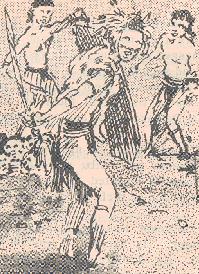|
During the uprising at the Pasir Nai by thousands of volunteers against the enemy, the fate of the Defence Corps and the prisoners was unforeseen. The plan of Sergeant Kassim did not run true to course. The Corps and prisoners were as surprised and petrified as their masters were, at the sight of the warriors. The Defence Corps reached for their shotguns stacked a short distance away, but a shower of spears flew between them and the guns, amidst shouts of "Anang! Anang laban!" The terrified men, the headhunting tales they had heard were confirmed. The shouts of "Anang laban!" were lost in the general clamour and the terror of headhunters. They again attempted to reach for their guns, but the next flight of spears killed and wounded some. the rest grabbed firebrands and branches as the prisoners had done. some terrified men ran sobbing to escape, but there were warriors everywhere! The Iban warrior on seeing their hostile attitudes, charged them. Swords, spears, firebrands and branches found victims. Limbs flew into the air, heads rolled on the ground and dull thuds on sword fell on exposed bodies. The stretch at Pasir Nai was reddened with blood. Screams of pain and the dying filled the air. The Sergeant peering throught his binoculars at the tragic scene of battle, jumped to his feet in desperation and in anger. The day's event was beyond control. Closely followed by half a dozen volunteers from Belaga, he raced downhill shouting: "Ber-hin-ti! Ber-hin-ti! Orang Jepun sahaja!" He kept shouting more in anger than hoping to be heard, as he ran and slithered. His men patiently kept up with him. On the way downhill, the cracking of leaves and twigs and the shouts of excited warriors attracted them. They saw two local Defence men terrified and panting in exhaustion, and hotly pursued by a dozen Iban warriors. "Di sini! Di sini! The sergeant shouted and waved at the tired men, who paused and changed course, ran and quickly took shelter behind the sergeant and the volunteers. The Iban warriors advanced menacingly, then turned trotting back to the sandbank. The sergeant was dertermined to save the two dazed men and waving the warriors to leave, continued his way down.
Six heads, two with close-cropped hair, eyes-lids half-lowered and faces in death's grimace, laid on the sand. The two dancers were unmistakably Ribu and Rangan. They danced with varied feeling of a headhunter on the prowl. They held up their heads with a poise of listening, peering and calculating. Their bodies contorted to hide themselves in the shadows and behind tree trunks and bounds, reached the enemy. Their hands held their sheilds in defence and their sword were pwrried in thrusts and chops. With triumphant yells, the "headhunters" danced away with the victims, heads in their hands. The two penghulus were in a sweat at the end of the dance before they noticed Sergeant Kassim, who had never before witnessed such true-to-life repertoire. He was very impressed and secretly happy at the demonstration of the two experts. He approached them and complimented on their dance and at the same time, told them off for the killing of some of the local Defence Corps and prisoners. "Kati! Bukai tu ngayau? Musoh laban kitai, kitai laban ia! Nama tu! " Ribu and Rangan, never before in complete aggreement objected to the sergeant's protests vehemently. They stood on their words unwaveringly. Sergeant Kassim, fearing an incident, finally took hold of himself. He dicidedit was not the time nor place to make a fuss. He tactafully ended the argument. The dark looks of the warriors were not conducive to good relationship for a joint force against the enemy. There were seventy-three heads, seven of which were close-cropped ones. It was a small price to pay for the massive Iban support which was the main point, and for which the battle was fought. The timely arrival of the captain, however, saved the tense situation. He firmly agreed with the two penghulus. The prisoners and the stubborn Defence Corps had taken up arms and therefore, did not wish to surender. The circustances were most unfortunate, and he would shoulder the consequences. He advised the two penghulus to organise the warriors for an assault on Kapit the following day on three points. Each was to lead a party supported by Sergeant Strang and the Iban volunteers. Sergeants Oddham and Kassim were to leave that evening by perahu, taking advantage of the night, for Song. The Belaga volunteers under Tan were to return to Belaga with the two captured Defence Corps, who later, enthusiastically joined up to leave in a patrol, one to Mukah, and the other to Bintulu. Ribu, Rangan and Sergeant Strang found Kapit bazaar smouldering when they fought their way in. The enemy had fled downstream. Early that morning a Catalina flying boat had dropped leaflets urging the people to evacuate in view of the impending battle. Later in the day, it dropped a bomb, missed the wireless station, and hit a petrol dump, thus starting a fire which razed Kapit bazaar, and subsequently, the kampung. The people were not much troubled by this misfortune. They were glad to be liberated. With the fall of Kapit, the plan to wipe out the enemy near the Batang Rejang gathered momentum. Song fell, then Kanowit. The Japanese soldiers were determined to fight to their last in a strong fortification at the outskirts of Sibu. Eventually, they surrendered after receiving orders from Japan which had suffered dreadully from two atomic bombs. However, not all the Japanese officers were bad. Certainly there were sincere ones who had hinted thay they could not win the war. War was not the only way to settle differences, they had stated. But who were they to voice such an opinion? Finish
|
